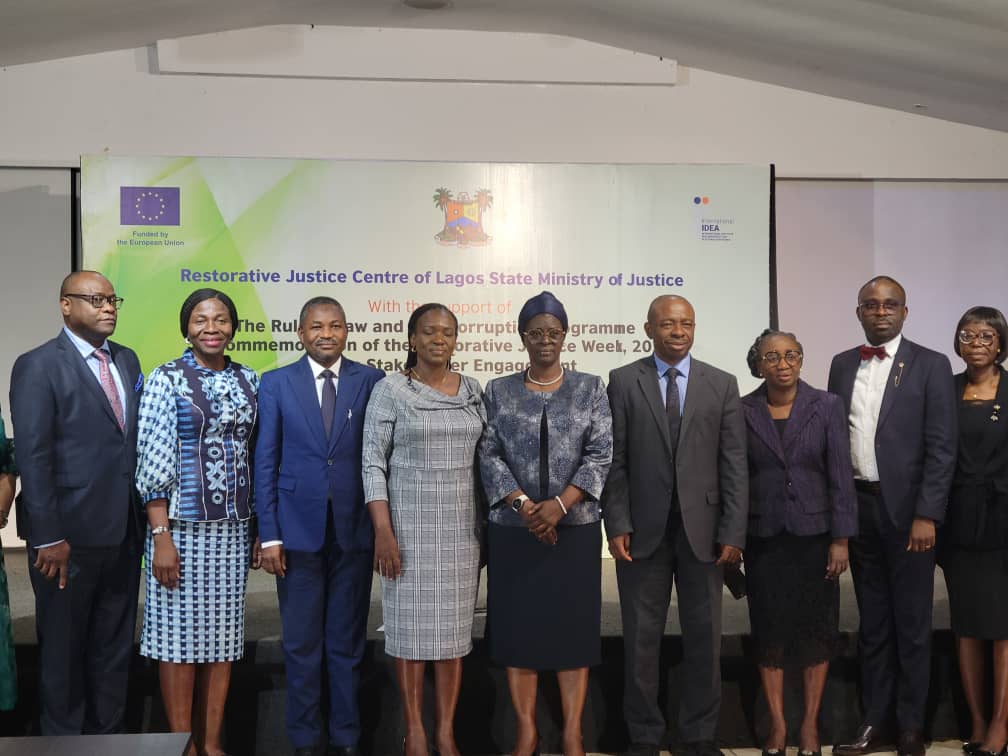The Lagos State Chief Judge, Justice Kazeem Alogba, the Attorney General and Commissioner for Justice, Lawal Pedro (SAN), have identified a collaborative effort of government agencies, the judiciary, civil society, and community leaders as the pathway to scale up the impact of Restorative Justice in Nigeria.
They spoke in Lagos on Thursday at a stakeholders’ engagement in commemoration of Restorative Justice Week, 2024, organized by Restorative Justice Centre of Lagos State Ministry of Justice with support of the Rule of Law and Anti-Corruption (RoLAC) programme.
The programme is funded by the European Union and implemented by the International Institute for Democracy and Electoral Assistance (International IDEA).
Alogba who was represented by Justice Adeyinka Adeyemi pointed out that the concept of restorative justice is deeply rooted in healing and reconciliation, noting that the initiative is already being embraced by countries around the world.
- ICPC begins tracking of N41bn constituency projects in Kano
- Okpebholo sets up committee to recover ‘missing’ gov’t vehicles under Obaseki
The CJ described the conversation on restorative justice as very apt, saying it came at a time when decongestion of the court is in the front burner of the criminal justice system.
“We know that in applying restorative justice, few children in conflict with the law have potential of reducing recidivism, promoting integration and rehabilitation of these children who are in conflict with the law.
“Most importantly, it will invariably decongest the court, particularly the magistrate court. This is a welcome development because it will reduce the docket of the court,” the CJ said.
On his part, Pedro who was represented by a Director and Senior Special Assistant (SSA), Adebayo Haroun, said restorative justice’s approach aligns with the government’s commitment to fostering a fair, inclusive, and people centred justice system.
“Over the years, Lagos State has been a trailblazer in promoting innovative justice reforms, and Restorative justice stands as a cornerstone of these efforts.
“This stakeholders’ meeting underscores the essence of collaboration. It is only by working together – government agencies, the judiciary, civil society, and community leaders – that we can scale the impact of Restorative Justice.
“Your role as stakeholders is critical in bridging gaps, creating awareness, and ensuring that every citizen has access to justice that is not only swift but also transformative,” he said.
The keynote address speaker, Mrs Adeyinka Aroyewun, said the establishment of the Restorative Justice Centre in 2022 marked the beginning of a new chapter in the criminal justice sector.
According to her, since the establishment of the RJ Centre, 177 cases have been referred, with 83 cases resolved amicably, each resolved case represents not just numbers but real lives impacted positively, it translates into 83 fewer court cases and a reduction in correctional facility congestion.
Aroyewun identified reaching offenders, limited awareness among stakeholders, funding constraints and public awareness deficit as some of the challenges confronting the initiative.
Going forward, she recommended institutionalised funding, strengthened collaboration, expanded training and capacity building, promotion of a culture of dialogue and peace.
The State Coordinator of RoLAC, Mrs Ajibola Ijimakinwa, said the RoLAC Programme is committed to consolidating the law and strengthening anti-corruption efforts in Nigeria.
“RoLAC strives to ensure that justice service delivery is robust, transparent, and responsive to the needs of all Nigerians.
“Over the past year, RoLAC and its partners, including the Lagos State Restorative Justice Centre, have worked diligently to promote restorative justice practices. We have witnessed the tangible impacts of this approach: cases resolved through dialogue, reduced pressure on courts and correctional facilities, and restored relationships within communities,” she said,
She submitted that these outcomes demonstrate that “restorative justice is not only a tool for resolving conflicts but also a means of nurturing peace and unity in our society.”
The Chairman of the Ikeja NBA, ‘Seyi Olawumi, noted that while reflecting on the progress made in the restorative justice initiative and the work lying ahead, there is a need to reaffirm collective resolve to create “spaces where healing takes precedence over punishment and where justice restores rather than divide.”
Olawumi said legal practitioners have critical roles in promoting equitable access to justice, guiding individuals through restorative justice processes and ensuring that the approaches complement the broader justice system.
“The Ikeja Bar remains steadfast in its commitment to supporting restorative justice initiatives,” the chairman declared.

 Join Daily Trust WhatsApp Community For Quick Access To News and Happenings Around You.
Join Daily Trust WhatsApp Community For Quick Access To News and Happenings Around You.


